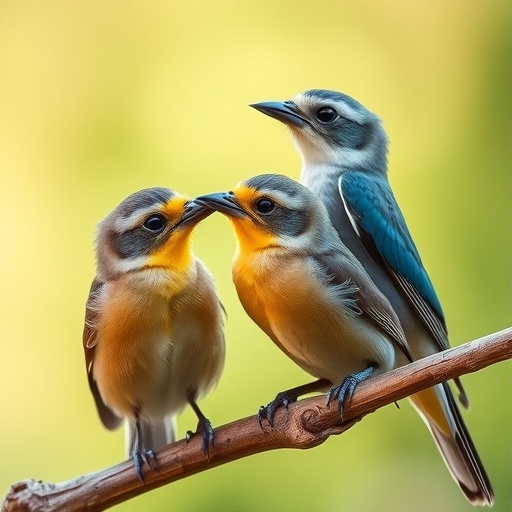In a groundbreaking study published recently in PLOS Biology, researchers have uncovered intriguing insights into the learning behaviors of juvenile European great tits (Parus major). Contrary to the longstanding belief that young animals primarily acquire crucial survival skills from parental figures, this research reveals a more complex social learning landscape. The study demonstrates that siblings and non-parental adults serve as significant sources of knowledge for these young birds, providing alternative pathways to cultural inheritance beyond direct parental transmission.
European great tits are a model species in behavioral ecology, particularly known for their social learning and problem-solving abilities. However, their juvenile learning habits have remained surprisingly underexplored until now. The new study, led by Sonja Wild and her colleagues from the Max Planck Institute of Animal Behavior, Germany, sheds light on how these birds navigate the critical transition from dependence to independence—a period marked by the urgent need to acquire life skills rapidly and efficiently.
Central to the investigation were automated puzzle boxes designed to challenge the birds’ foraging capabilities. These feeding puzzles required the birds to slide a door either left or right to access food rewards, thus testing their problem-solving skills. The design was particularly effective for collecting high-resolution data on a large scale, as the birds were microchipped, allowing for precise tracking of individual interactions and puzzle-solving events over time.
The results were revelatory. While juveniles with skilled parents did demonstrate an increased likelihood of solving the puzzles, suggesting some level of parental influence, the data revealed a much stronger imprint of social learning from older siblings and other experienced flock members. Notably, more than 90% of the learning observed in younger siblings could be directly linked to these non-parental sources. This challenges traditional views on cultural transmission in animals where parents are typically considered the main mentors.
This multi-generational knowledge transfer within great tit families emphasizes the nuanced social structures that shape learning in natural environments. Siblings, often overlooked in studies of cultural inheritance, appear to play a pivotal role in shaping the behavioral repertoire of juveniles. These findings support the idea that animal cultures are maintained and evolved not just through vertical (parent-to-offspring) transmission, but also via horizontal and oblique pathways involving peers and unrelated adults.
The implications extend beyond avian behavior into broader ecological and evolutionary contexts. By demonstrating that juveniles utilize social learning strategies that circumvent direct parental care, this research provides a compelling evolutionary advantage. In environments where parental input is limited—such as in species with brief dependency periods—relying on a broader social network can enhance adaptability and survival prospects.
Moreover, the experimental approach allowed the researchers to disentangle the complex decision-making processes juveniles employ when choosing whom to learn from. The high number of puzzle interactions—amounting to tens of thousands of solves among hundreds of individuals—provided an unprecedented data set that facilitated deep insights into learning pathways and the strategies juvenile birds employ during their gradual move to independence.
This approach exemplifies how integrating advanced technology with behavioral research can unlock the intricacies of animal cognition and culture. The automated puzzle boxes not only measured individual problem-solving success but also recorded temporal and social interaction patterns, offering a detailed window into the dynamics of juvenile learning networks.
Interestingly, the eagerness of juvenile great tits to engage with the puzzle boxes exceeded expectations. Despite the intense selection pressures acting on this vulnerable stage of life, the birds demonstrated remarkable motivation, consuming approximately 33 kilograms of mealworms in just a few weeks. This high level of participation indicates a natural propensity towards exploration and social learning during this formative period.
The study’s authors highlight the need for future research focusing on how extrinsic factors like environmental variability and developmental stress influence these social learning dynamics. Understanding how fluctuating conditions modulate juvenile reliance on siblings and the broader social group could provide deeper insights into the resilience and adaptability of animal cultures.
These findings resonate strongly with broader themes in animal behavior and cultural inheritance. They emphasize the importance of investigating not just parental roles but the wider social milieu that shapes juvenile knowledge acquisition. Such comprehensive perspectives enrich our understanding of the evolution of learning strategies across taxa.
In conclusion, the research by Wild and colleagues marks a pivotal advance in our understanding of cultural transmission mechanisms in animals, demonstrating the complexity and flexibility of social learning networks in juvenile great tits. By revealing the critical role of siblings and non-parental adults, the study reshapes foundational assumptions about the origins of animal culture and highlights new pathways through which knowledge and behaviors propagate within communities.
This compelling revelation opens up exciting avenues for further explorations into how social structures and environmental pressures interact to influence learning and culture across species, ultimately enriching our appreciation of animal intelligence and social complexity.
Subject of Research: Animals
Article Title: Siblings and nonparental adults provide alternative pathways to cultural inheritance in juvenile great tits
News Publication Date: October 9, 2025
Web References:
References:
Wild S, Alarcón-Nieto G, Aplin LM (2025) Siblings and nonparental adults provide alternative pathways to cultural inheritance in juvenile great tits. PLoS Biol 23(10): e3003401.
Image Credits:
Credit: Sonja Wild (CC-BY 4.0)
Keywords: social learning, cultural inheritance, juvenile birds, European great tits, problem-solving, behavioral ecology, multi-generational knowledge, automated puzzle boxes, animal cognition, social networks, sibling learning




